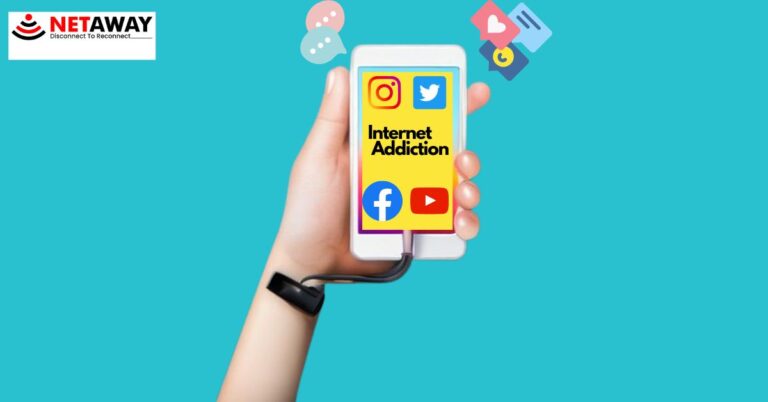
In today’s hyperconnected world, the internet has become an integral part of our daily lives. While it offers numerous benefits, excessive internet use can lead to addiction, negatively impacting our productivity, relationships, and overall well-being. In this article, we will explore practical strategies to break free from internet addiction and regain control over our digital lives.
1. Recognize the Signs of Internet Addiction
The first step in overcoming internet addiction is acknowledging its presence. Be aware of signs such as excessive time spent online, failed attempts to cut back, neglecting responsibilities, isolation from real-life activities, and withdrawal symptoms when disconnected. Identifying these signs will help you understand the extent of your addiction and the need for change.
2. Set Clear Boundaries
Establishing boundaries is essential in reducing internet dependency. Define specific time limits for internet usage and stick to them. Designate certain hours for productive work, leisure activities, and quality time with loved ones. Create tech-free zones in your home, such as the bedroom, to promote better sleep hygiene and maintain a healthy work-life balance.
3. Find Offline Alternatives
Replace excessive internet use with fulfilling offline activities. Engage in hobbies like painting, playing a musical instrument, reading books, or practicing mindfulness. Explore outdoor activities, exercise regularly, and socialize with friends and family. By finding enjoyable alternatives to online distractions, you can redirect your focus and regain a sense of fulfillment in the real world.
4. Practice Digital Detox
Periodically disconnecting from the internet can help break addictive patterns. Designate specific days or weekends as digital detox periods. Use this time to engage in activities that nurture your mental and emotional well-being. Consider deleting social media apps temporarily, disabling notifications, and limiting screen time. Embrace the opportunity to reconnect with nature, reflect on personal goals, and rediscover offline pleasures.
5. Develop Healthy Coping Mechanisms
Internet addiction often serves as a coping mechanism for stress, anxiety, or boredom. Instead of turning to the internet, explore healthier alternatives. Practice mindfulness meditation, journaling, or deep breathing exercises to manage stress and emotions. Consult with friends, family, or a professional for assistance in addressing underlying emotional problems.Develop a support system that encourages and motivates you in your journey towards breaking free from internet addiction.
6. Create a Productive Digital Environment
Structure your digital environment to minimize distractions. Organize your desktop, declutter email inboxes, and unsubscribe from unnecessary newsletters. Utilize productivity apps or website blockers to limit access to time-wasting websites or social media platforms. Optimize your digital workspace to foster focus, efficiency, and reduced temptation for mindless browsing.
7. Seek Professional Help
If self-help strategies prove insufficient, seeking professional guidance can be beneficial. Consult a therapist specializing in addiction or internet-related issues. They can provide personalized strategies, therapeutic interventions, and support tailored to your specific needs. Professional help can offer valuable insights, accountability, and guidance on your path to recovery.

Symptoms of Internet Addiction:
1. Excessive screen time and prolonged internet use.
2. Neglecting important responsibilities, such as work, school, or personal relationships.
3. Difficulty controlling or reducing internet usage despite attempts to do so.
4. Preoccupation with online activities, constantly thinking about or planning the next online session.
5. Withdrawal symptoms when unable to access the internet, including irritability, restlessness, or anxiety.
6. Neglecting self-care or physical health due to excessive internet use.
7. Escaping from real-life problems or emotions by immersing oneself in the online world.
8. Decline in academic or professional performance due to prioritizing internet use.
9. Feelings of guilt, shame, or anxiety related to online activities.
10.Using the internet as a primary source of social interaction, often at the expense of in-person relationships.
Remember, experiencing some of these symptoms does not automatically indicate addiction, but if they significantly impact your daily life and well-being, it’s important to seek help and make positive changes.
FAQs
Is internet addiction real disorder?
Yes, internet addiction is recognized as a real disorder. It is classified as a behavioral addiction characterized by excessive and compulsive internet use, leading to negative consequences on an individual’s physical, mental, and social well-being. It shares similarities with other forms of addiction and is increasingly acknowledged by mental health professionals.
When did internet addiction start?
When extensive internet access first became available in the late 1990s, internet addiction first emerged. Researchers started investigating the possible addictive consequences of the internet as consumption grew. Since the early 2000s, when the phrase “internet addiction” was first used, research and public understanding of the problem have expanded.
How common is internet addiction?
In the current digital era, internet addiction is a serious problem. According to studies, internet addiction can affect anywhere between 1% and 10% of people worldwide. But with our reliance on technology and the internet growing, it’s critical to be aware of the risk of addiction and take proactive measures to keep a good digital balance.
What are the effects of the internet?
The internet has a wide range of affects. It has transformed communication by enabling immediate, worldwide connectivity. Access to knowledge, education, and entertainment has been made easier. It may, however, also be a factor in addiction, a decline in attention span, cyberbullying, privacy issues, and false information. It is essential to weigh the hazards and advantages of it.
How does internet addiction affect the brain?
There are various ways that internet addiction may affect the brain. It may result in modifications to the brain’s reward system, which may impact dopamine levels and induce cravings. The brain networks that govern attention, memory, decision-making, and impulse control can also be affected by excessive internet use. Furthermore, it could help with social and emotional instability.

[…] the internet can be a valuable source of information, self-diagnosis poses several risks. Misinterpreting […]
[…] addiction, like any other form of addiction, can be overcome with determination, discipline, and the right strategies. By acknowledging the addiction, setting […]